This post contains affiliate links.
I have been interested recently in games that reinforce important life skills. To me, conflict resolution is a key one and I wanted to investigate how board games can help.
There are 7 useful conflict resolution board games available (including a Bingo game) – for children from 7 to 17-year-olds. Most are designed primarily for school use. I particularly recommend “Stop, relax and resolve” and “Peacetown” as games with broad conflict resolution objectives.
Recommended Conflict Resolution Games Comparison Table
Among these 7 games, I recommend the following 5.
| Game | Age | Players | Skills covered | Target | Rating |
|---|---|---|---|---|---|
| Stop, relax and resolve | 7‑12 | 2-6 | 12 | School | ★★★★★ |
| The social conflict game | 8‑12 | 1-6 | 7 | School | ★★★☆☆ |
| Peacetown | 7‑12 | 2-6 | 13 | School | ★★★☆☆ |
| 6 conflict and resolution board games | 6‑10 | 2-6 | 3 | Home | ★★★★☆ |
| Conflict resolution bingo | 10‑17 | 2-32 | School | ★★★☆☆ |
7 Conflict Resolution Board Games
Stop, Relax & Resolve (Childswork Childsplay)
★★★★★
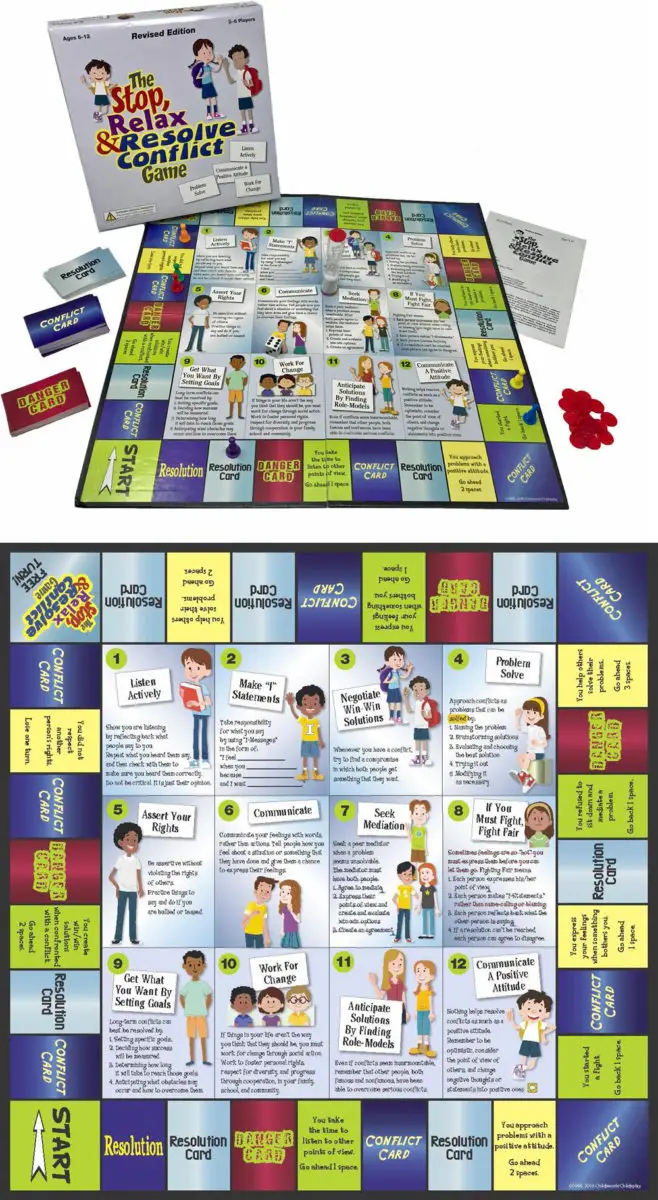
Age: 6-12 (Grades 1-6) according to the publisher, but I recommend age 7 to 12.
2 to 6 players
The Stop, Relax & Resolve Conflict board game presents the 12 conflict resolution techniques taught by the game on the center of the board (with clear explanations):
board game presents the 12 conflict resolution techniques taught by the game on the center of the board (with clear explanations):
- Listen actively
- “I” statements
- Finding win-win solutions
- Solving problems
- Asserting one’s rights
- Communicating
- Seeking mediation
- Fighting fair
- Setting goals
- Working for change
- Finding role-models
- Positive attitude
These techniques are visually accessible to all players all the time, which is really great (you toss dice to determine the type of solution to use). The explanations are short and to the point, and help teach children to resolve conflicts in peaceful and productive ways.
The game uses 3 types of cards:
- Danger cards: conflict situations implying an immediate danger either to themselves or others (bullies, drug pushers, a kid with a gun…)
- Conflict cards: more day to day conflict situations (teasing, handling arguments…)
- Resolution cards: to use for role-playing
The cards and the well-thought-out board make this game a very useful tool.
This game offers a lot of flexibility, as situations are presented with cards, you can:
- Add your own cards if you want to enrich the game
- Sort the cards if you want to focus on a set of situations.
The fact that it is a board game, as well as its approach, makes it useful both for counseling and at school; but you might want to alter just a bit the rule to create shorter play, according to the time you have available. It can be used at home without any problem, but it might be too expensive for most parents.
So I highly recommend “Stop, relax and resolve”.
You might want to have a look at this video which briefly presents an older version of this game:
The Social Conflict Game (Berthold Berg)
★★★☆☆
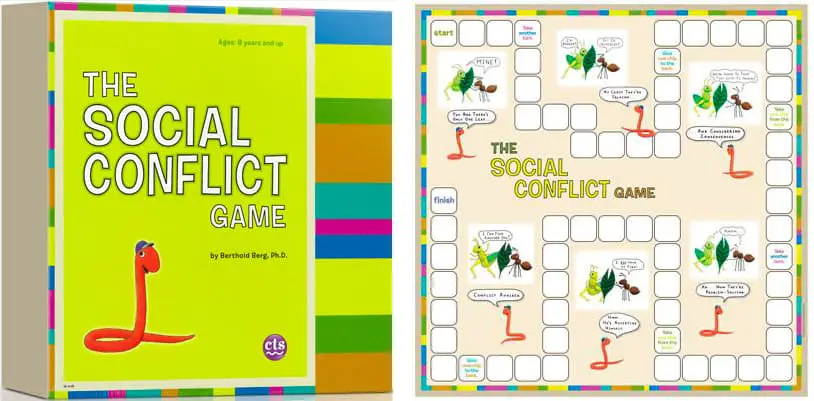
Age: 8+ (Grades 3+)
1 to 6 players
Author: Berthold Berg
The Social Conflict Game teaches children seven cognitive and behavioral conflict resolution skills to reduce interpersonal antagonism:
teaches children seven cognitive and behavioral conflict resolution skills to reduce interpersonal antagonism:
- Identifying circumstances as a source of conflict
- Assuming personal responsibility
- Understanding the other person’s point of view
- Incorrect beliefs that justify aggression
- Anticipating consequences
- Assertive behavior
- Problem-solving
The game includes 200 question cards (one color per conflict resolution skill). This enables one to focus on a specific skill and decline it in different situations.
Here are some examples of question cards:
| Problem-solving card | Erin has a bad habit of talking about her friends behind their backs. She knows that she has hurt some feelings in the past, but she can’t help herself. She really wants to stop gossiping so much. What are some possible solutions to this problem? Which solution would be best? Why |
| Personal responsibility card | Maria tells Sharon that her hair would look better if she got it cut. When Sharon angrily walks away, Maria thinks, “All I was trying to do was trying to make her hair look better. What’s the big deal?”. What error did Maria make in her thinking? What could Maria have done differently? Pretend you are Maria. Pick someone else to be Sharon. Role-play the situation. |
I find this game rather good, but less rich (both in the type of resolution approaches and in the way the information is presented) than “Stop, relax and resolve.” I do recommend it as it is a good tool that you can definitely use.
PeaceTown (Western Psychological Press)
★★★☆☆
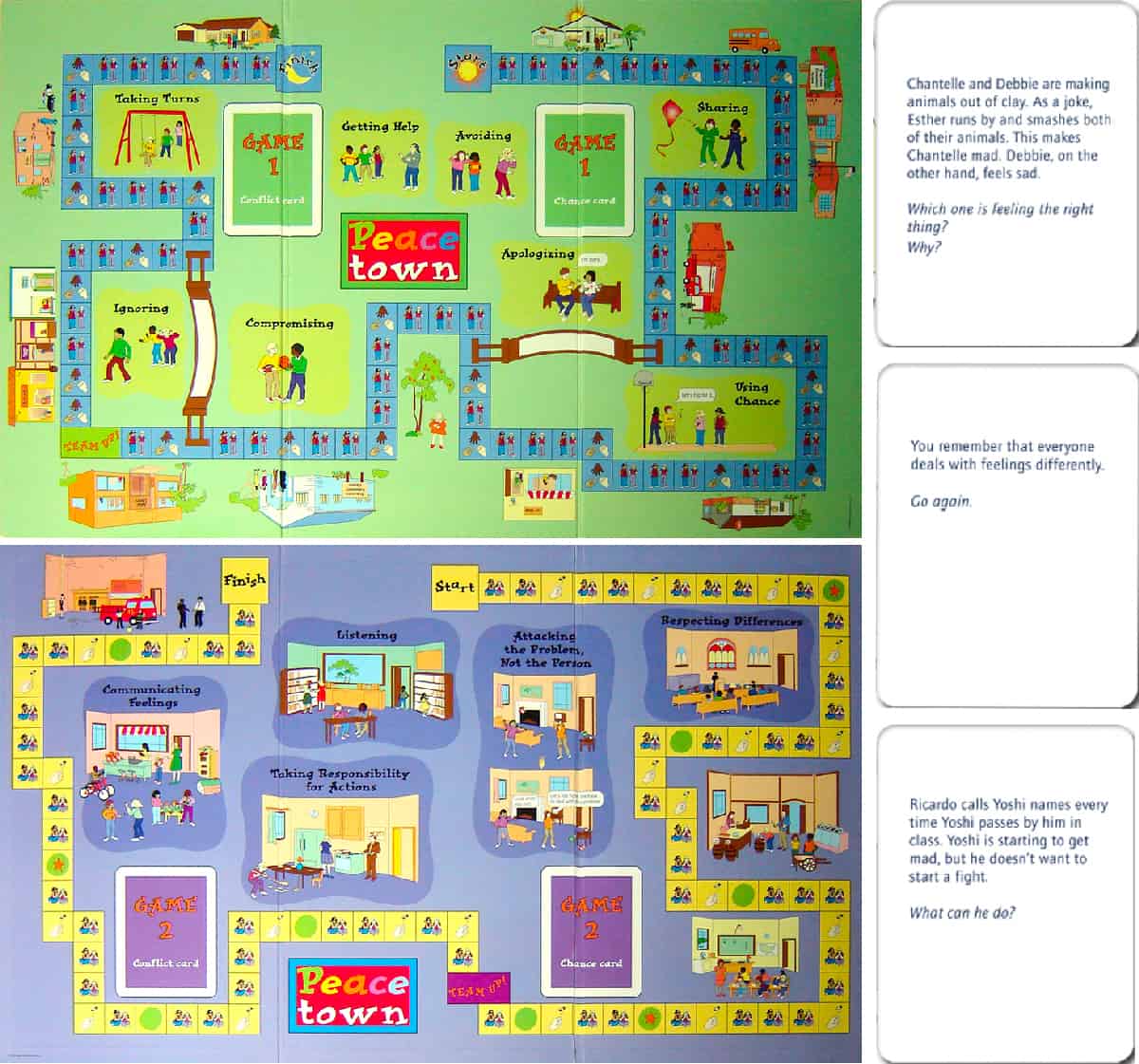
Age: 7 to 12
2 to 6 players
Author: Eric Terry
PeaceTown contains a two-sided gameboard, which allows playing the game at two progressive levels:
contains a two-sided gameboard, which allows playing the game at two progressive levels:
- Side 1 – 8 Basic conflict resolution skills:
- Apologizing
- Compromising
- Taking turns
- Sharing
- Avoiding
- Ignoring
- Using chance
- Getting help
- Side 2 – 5 Deeper conflict resolution skills:
- Listening
- Respecting differences
- Communicating feelings
- Taking responsibility for actions
- Attacking the problem rather than the person
Conflict resolution skills are written on the board and are therefore always visually available during gameplay, which helps better recall them (similarly to “Stop, relax and resolve“, but with illustrations rather than explanations).
Players read conflict cards that feature an explanation of the conflict situation (70 conflict cards overall). They chose conflict resolution skills relevant to this conflict, and collect points for correct answers. The game also comprises 60 chance cards.
When there are 4 players or more, they also form teams and finish the game solving conflicts together, which is very good for creating a discussion about the best conflict resolution options possible.
I recommend the game for counselors, therapists, and teachers. It is a bit too expensive for most parents (professionals will use the game many times, fully justifying its price).
6 Conflict And Resolution Board Games (Junior Learning)
★★★★☆
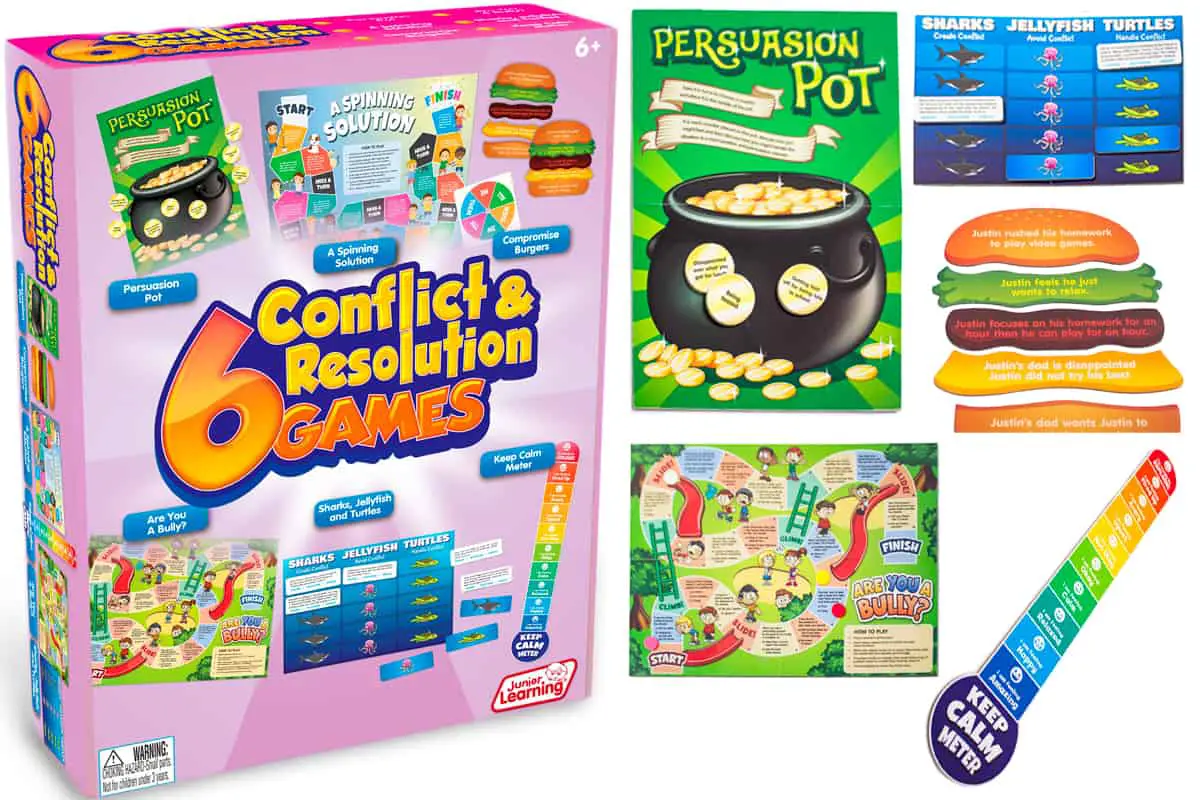
Age: 6 to 12
2 to 4 players
“6 Conflict and Resolution games ” is a box with a set of 6 games that focus on how to recognize conflict, how to handle it and how to resolve differences in a positive solution-focused way.
” is a box with a set of 6 games that focus on how to recognize conflict, how to handle it and how to resolve differences in a positive solution-focused way.
This is achieved by teaching children:
- About common conflict situations
- To recognize different emotional triggers
- To understand and apply different conflict resolution techniques
Each game uses a different gameplay. There are:
- 2 board games
- “A Spinning Solution”: finding solutions that benefit me, the others or both
- “Are You a Bully”: understanding bullying behaviors
- 1 matching game, “Sharks Jellyfish Turtles”: conflict causes, avoidance, and handling
- 1 counter game, “Persuasion Pot”: discussing how to handle conflict
- 1 thermometer game, “Keep calm meter”: measuring your anger level
- 1 puzzle game with 20 pieces: “Burgers” for identifying situations, emotions and solutions
The games are very basic – easy to understand for parents that do not have training in conflict management related curriculum. They are cute, making them attractive for small children.
I recommend “6 Conflict and Resolution games” for playing at home. It is a fun approach that is also easy to understand.
The 3 Franklin Conflict Resolution Games
In the late 90’s, Franklin Learning Systems created a series of three conflict resolution board games that are still available today; the games are in their original print run, have not been restyled or reprinted since):
- Conflict Busters (2000): a cooperative game for ages 7-11 with a space travel theme
- Meeting of the Minds (1997): a competitive game for ages 10-14
- Common Ground (1997): a competitive game for ages 14+, teens but also adults (solving professional conflicts)
According to the age group of your students, you might be interested in one of them; even though they look very dated, their original game mechanisms work fine. I do not recommend them as there are more modern & attractive alternatives at the same price today (“Peacetown“, “The social conflict game” and “Stop, relax and resolve“). But of course, if you have one of these games at your school, please use them as they are effective.
Meetings of the Minds (Franklin – 1997)
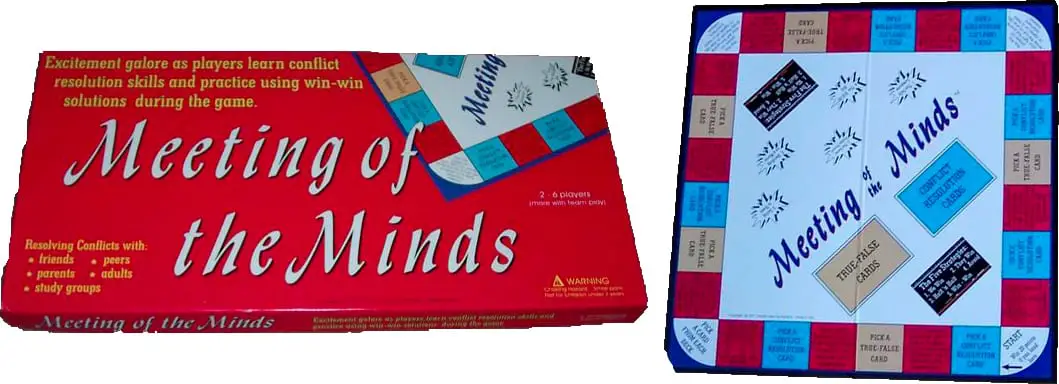
Age: 10 to 14 (Grades 5-8)
2 to 6 players
In Meeting of the Minds , players earn points in two ways:
, players earn points in two ways:
- By answering correctly to questions on effective ways of resolving conflicts (after picking a “conflict resolution” and a “true-false” card). This helps them check their knowledge for successful conflict resolution.
- By resolving conflicts with other players that occur during the game through win-win solutions. This enables them to apply this knowledge during the game.
This leads to both cooperation (to find solutions) and competition to win the game.
Common Ground (Franklin – 1997)
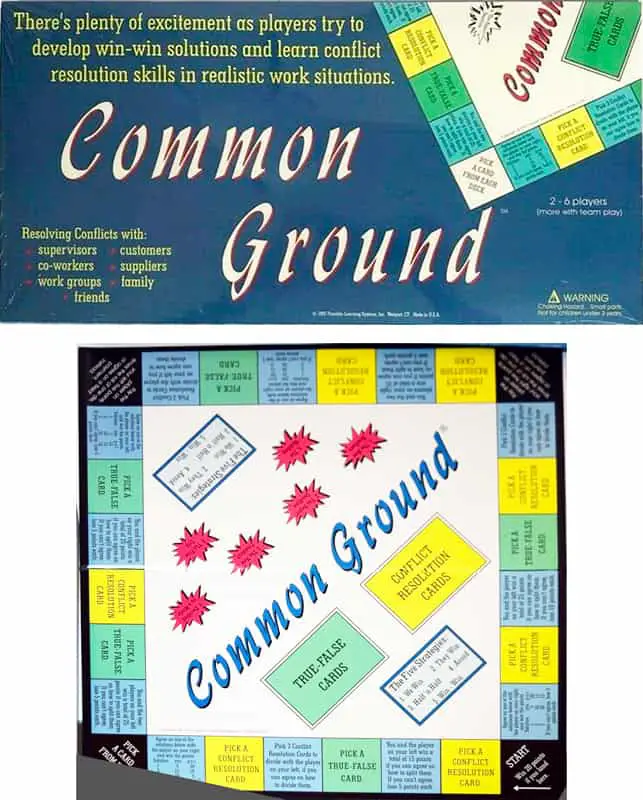
Age: 14+
Players: 2-6
With “Common Ground “, Franklin developed a version of the “Meeting of the Minds” game aimed at adults of older students (14+), and particularly professionals (work situations).
“, Franklin developed a version of the “Meeting of the Minds” game aimed at adults of older students (14+), and particularly professionals (work situations).
The principle of the game is the same, but with skills to develop that are relevant for work situations.
Conflict Busters (Franklin – 2000)
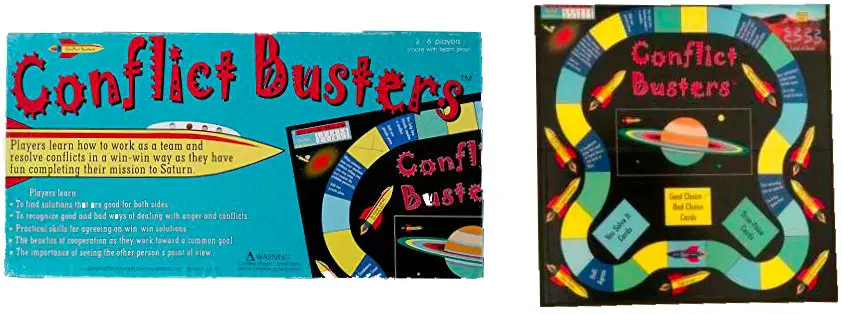
Ages: 7-11
Players: 2-6
Conflict Busters is a cooperative educational game with a space travel theme. It teaches peaceful conflict resolution techniques and anger management skills.
is a cooperative educational game with a space travel theme. It teaches peaceful conflict resolution techniques and anger management skills.
The objective of the players is to complete a space trip to Saturn. To do this they assemble a puzzle in the center of the board with pieces they earn by answering questions about conflict resolution. The questions (on cards) are sorted in two levels by age. Some of them include conflicts that could occur on a space voyage.
Conflict Resolution Bingo Games
Conflict Resolution Bingo (Childswork / Childsplay)
★★★☆☆
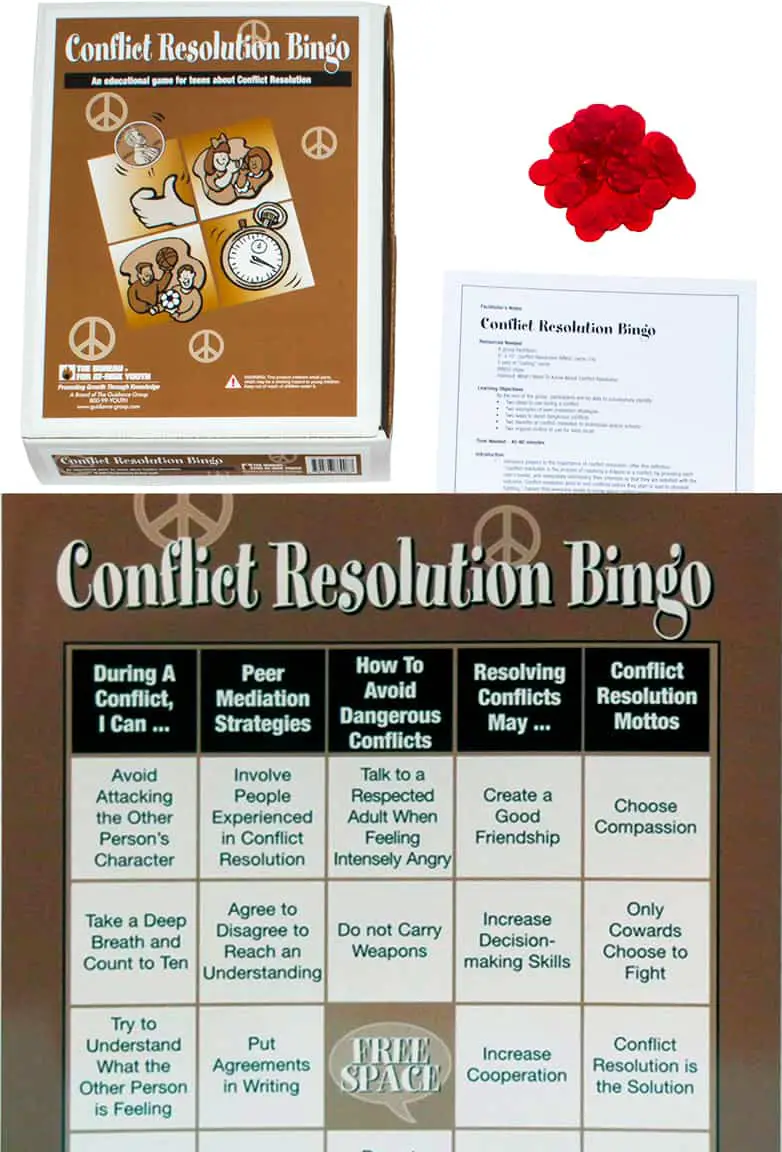
Ages: 10-14
Players: 2-32 (16 bingo cards included)
If you want an already made bingo game for working on conflict resolution skills in your classroom, Conflict resolution bingo is, in my opinion, a good option. The cards have questions about conflict resolution and corresponding answers.
is, in my opinion, a good option. The cards have questions about conflict resolution and corresponding answers.
Bingo games are very simple to understand and play. The fact that it is a game of chance avoids competitiveness, which is good in a classroom setting.
If you make teams of two, you can play with your whole class (up to 32 students) with this bingo game, even if you have more than 16 students.
Other Types of Conflict Resolution Games
Card and Dice games are cheaper and quick to set up and can be a great alternative to board games. If you are interested in card or dice games for teaching conflict resolution, please read the following post: Conflict Resolution Card and Dice Games for Families and Schools.
School Indoor/Outdoor games/activities: moving your body while learning is another approach that definitely creates engagement and maintains all students alert. I intend to write a post on them in the near future! Any input from you on them will be welcome.
Edudingo.com is a participant in the Amazon Services LLC Associates Program, an affiliate advertising program designed to provide a means for sites to earn advertising fees by advertising and linking to Amazon.com. We also participate in other affiliate programs which compensate us for referring traffic.
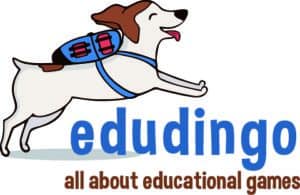
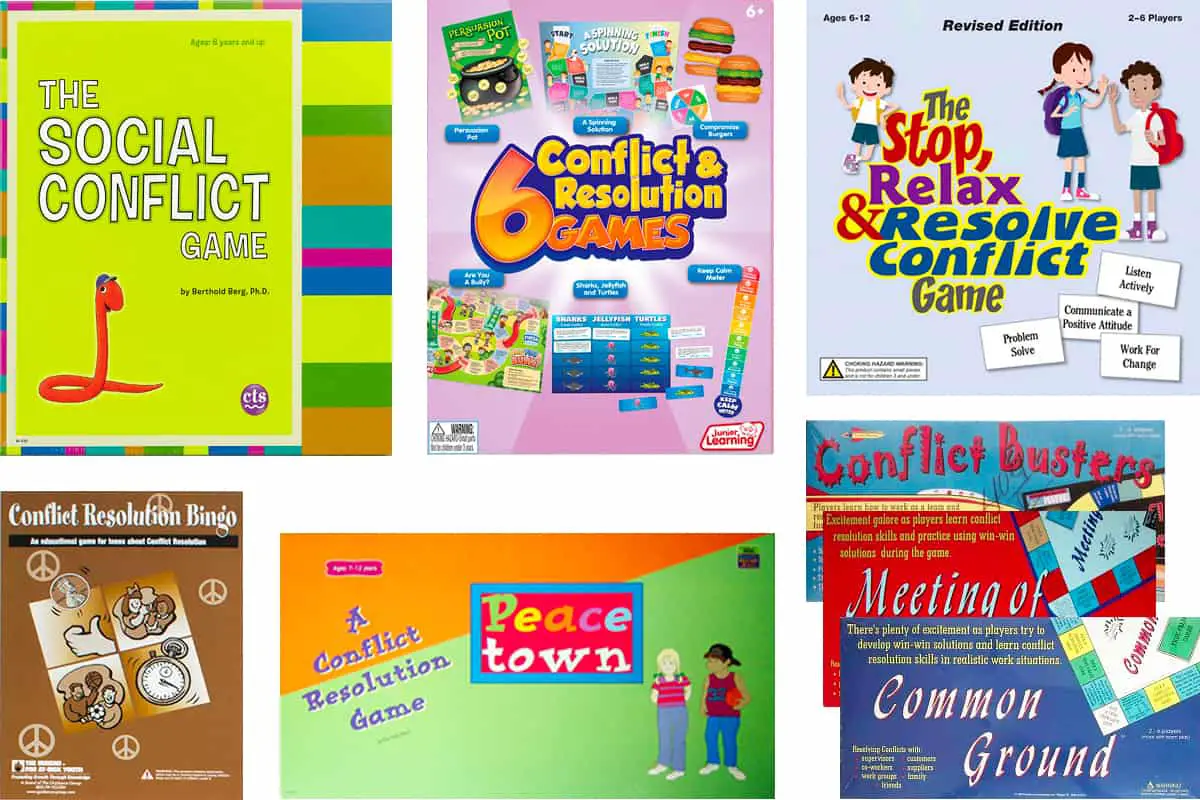

I work for a workshop for the developmentally disable, and I am teaching them some ways to deal with conflict. We are a nonprofit workshop. I was wondering if there was a way you could donate a couple of games,, the games are conflict resolution bingo, common ground, the social conflict game. If this could be done thank you very much.
Hi Leanne,
I understand that these games could be helpful for your workshop. We are not the publishers of these games though (and we do not sell them either). You could ask “Childswork / Childsplay” and “Franklin” which are the publishers of these games, and might be able to do it.
Kind regards
François Guély